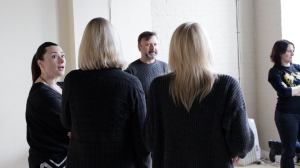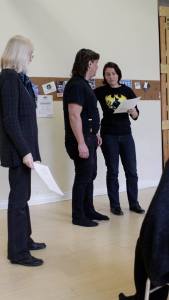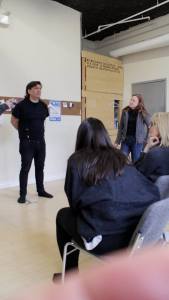Scene Selections
The ritualized unpunctuated text exercise this week was drawn from Claudius’ welcoming Rosencrantz and Guildenstern. It was relatively obscure enough and filled with suitably tricky sub-clauses to pose a bit of a challenge.
For the first scene we turned again to Ophelia and Polonius, with a distraught Ophelia telling her father of Hamlet’s strange behaviour. After some initial difficulty in visualizing what Hamlet was actually doing to her – we had Hamlet enter the scene, in a theatrical equivalent to a flashback; and so, as Ophelia described the action, Hamlet was there performing it. Ophelia’s language immediately became very clear; and she was emotionally affected by the encounter. It was so effective that I would consider presenting the scene in this way. A brief discussion about Hamlet’s feelings in this scene prompted us to remember that this is only about Ophelia’s experience – her memory of what happened, as inaccurate and subjective as anyone’s memory can be..
The second scene involved Polonius telling the king and queen about Hamlet’s letter to Ophelia. (It’s interesting to note the extent to which the plot of the play is revealed, even within these brief extracts.) We had Polonius take centre stage, while Claudius and Gertrude listened with only half an ear – well used to his long-winded ways – until Polonius finally gets to the point about the problem stemming from Hamlet’s unrequited love. Claudius very much wants this to be the case; and the group entered into a debate about the extent to which Gertrude was complicit in the murder of her husband. (Nothing resolved there! – Although, I think she was in on it – and maybe felt she had good reason to throw over her violent husband for the more politically savvy, and gentler, Claudius.)
Third up was the moment between Hamlet and Rosencrantz and Guildenstern where Hamlet has them confess they were summoned by Claudius and Gertrude. What we went for here was to play the change from Hamlet’s distrust and anger towards his student friends to his relief that they are still honest enough to tell him the truth. He then shares with them some of his melancholy – making a real connection with them. Hamlet has plenty of time in the play to soliloquize to himself – but here he makes a human connection to his school friends. His fatal condemnation of them later in the play is made more poignant by a real connection with them here – and lessened if he is angry and contemptuous of them throughout.
Finally, we took on one of the monster monologues: “O, what a rogue and peasant slave am I”. We gave each actor in the workshop a chance to deliver the soliloquy, with a few notes for each as they went along. One of the most interesting things to come out of this exercise for me was the way in which the personality of each actor imprinted itself on the character. Even though similar beats were being hit as they moved through the speech, and similar phrasing in the delivery. That may sound obvious; but it was terrific to find oneself so engrossed in the reading of the same speech over and over, interpreted through such individual and expressive voices.
This blog covers the Meetup.com workshop session conducted on January 18, 2015.



[…] Hamlet: Act II […]
LikeLike